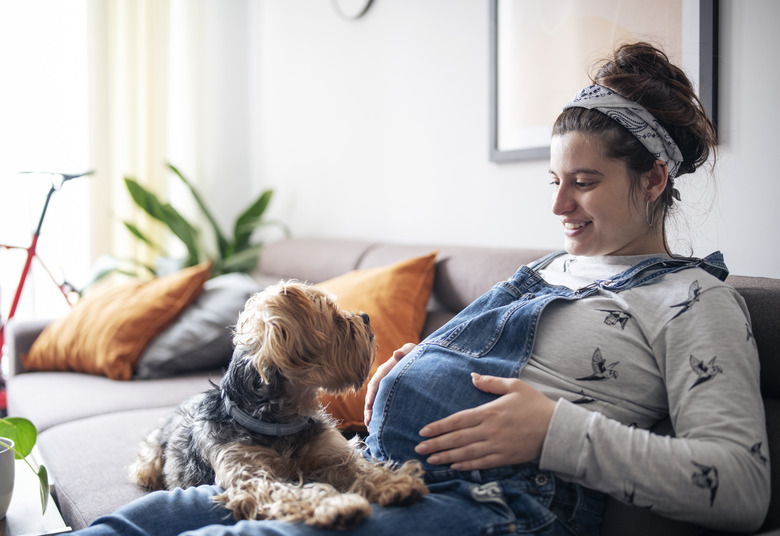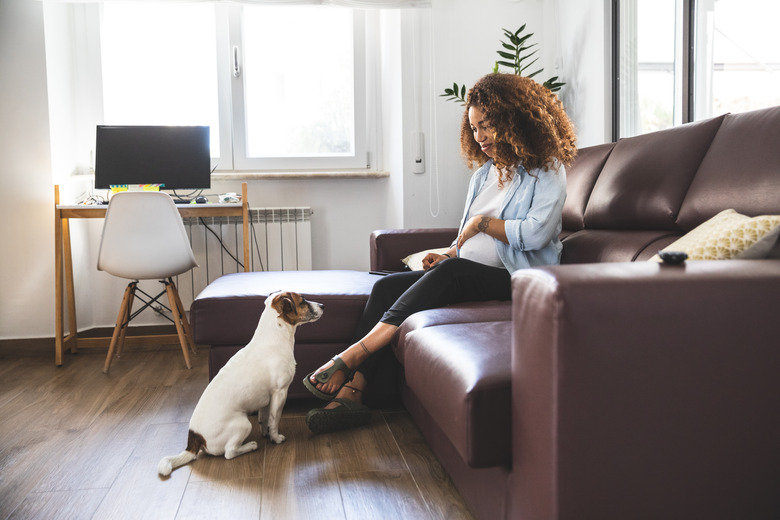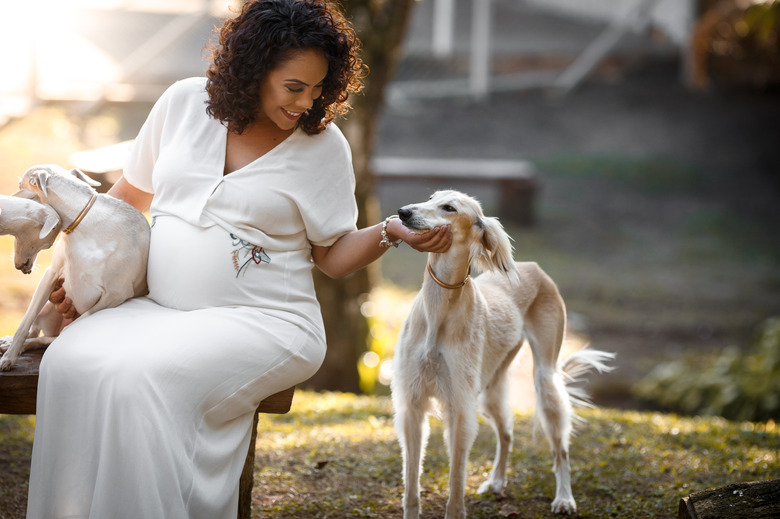Does Your Dog Know You're Pregnant?
Introducing a new baby to a household can be one of the most intense changes a family can go through — including a family with a dog. Some believe that dogs can tell there are changes brewing once their owner becomes pregnant. This is due to their extremely heightened sense of smell. So, can dogs sense pregnancy before there's an actual baby in the home? Some experts believe they can.
Can a dog smell a change in hormones?
Can a dog smell a change in hormones?
When a pregnant person is going through the hormonal changes that come with being pregnant, they may give off different smells to their dog. Dogs have 60 times as many smell receptors as human beings. Dogs also have 40 times as much brainpower dedicated to smell alone. This allows them to differentiate between 30,000 to 100,000 different smells.
A dog's sense of smell has worked with humans in the law and sciences. This includes the detection of drugs, explosives, and different illnesses — such as cancer, diabetes, or infectious diseases. While a dog may not know exactly what is going on with their pregnant owner, they do know something is different.
Can a dog sense a change in your behavior?
Can a dog sense a change in your behavior?
There is scientific evidence that supports the idea that dogs sense changes in an owner's behavior through their sense of smell. There is some data that hypoglycemia-alert dogs or diabetic service dogs, can sense low blood glucose levels in their owners. Some believe this is due to the physiological makeup of dogs' brains. The smallest change in a person's chemical structure, like low blood glucose levels, can be noticed by the service dog's nose.
Hormone changes during a human pregnancy can also lead to behavioral changes like sickness and fatigue. One of the first pregnancy hormones that the body produces when a person is carrying a child is the human chorionic gonadotropin (hCG) hormone. This hormone occurs during the second week after fertilization.
This is the same hormone that urine or blood sample pregnancy tests detect to see if a person is expecting. The hormone is responsible for nausea, vomiting, and morning sickness which often comes during the beginning stages of pregnancy, primarily the first trimester.
Dogs are naturally very observant animals and can pick up on different body language cues, moods, and emotions. This is especially with people they spend most of their time with. Any new changes in behavior can make a dog suspicious.
As a pregnant person grows, their fatigue and physical activity may slow. Walks may become shorter and a dog may realize that their daily routine has changed.
How early can a dog sense pregnancy?
How early can a dog sense pregnancy?
There is no way to pinpoint exactly when a dog starts to sense a family member may be pregnant. However, it could be assumed that once pregnancy hormones begin to alter a pregnant person's smell, behavior, and routine — a dog can sense something different.
The first trimester of pregnancy, the first 12 weeks of gestation, is when Human Chorionic Gonadotropin begins to take place. So, it could be said that your dog could very well start to sense something different, like a pregnancy, as soon as Human Chorionic Gonadotropin forms. A dog may not know what exactly is different but they may notice a change.
Will your dog’s behavior change during your pregnancy?
Will your dog's behavior change during your pregnancy?
When a sensitive dog realizes that changes are happening, they may have their own behavior changes. Some dogs may become protective over their owner's baby bump. Other dogs may become extra needy and want to cuddle more.
Depending on the dog's personality, they may display one or more of these other behaviors:
- Increased affection for — and protection of — the pregnant person
- Agitation, growling, barking, and/or being uncooperative
- Urinating around the house
- Chewing new items brought into the house for the baby
Can your dog sense your labor is coming?
Can your dog sense your labor is coming?
A dog is unlikely to sense that their person is in labor. But, they will likely notice behavioral changes in their owner when the labor begins. As a pregnant person gets closer to delivering, their body goes through big changes.
For example, if a dog's owner starts to experience Braxton-Hicks contractions, the dog might pick up on the pain and discomfort the owner is feeling and show concern. A pregnant person's body scent might also change slightly right before labor, which can trigger a reaction from the dog.
If a pregnant person is close to their due date and all of a sudden, their dog's behavior begins to alter, labor might be right around the corner. However, it's important to note that this is not because of some "sixth-sense" a dog has — but rather their keen sense of smell and observant nature.
How to prepare your dog for your baby’s arrival
How to prepare your dog for your baby's arrival
One of the most important things an expectant person can do in preparation for a new baby is preparing their dog for the new arrival. In the months before the baby comes, it's important to focus on two things. The first is teaching your dog the skills they'll need to interact safely with their potential new best friend. The second is helping your dog adjust to the many new experiences and changes ahead including routine and smells.
Having your dog able to obey basic skills can really help when it comes to taking care of a new baby plus your dog. When the baby comes home, some of your dog's privileges will likely change. It will be easier for your dog to accept the changes if you start the new rules in advance.
If you don't want your dog on your furniture or that they jump up on you after the baby arrives, introduce it early. Work on it through positive reinforcement training.
Some dogs have not spent much time if any with a baby before, and they can seem foreign to them. Babies cry, screech, and smell different to them. It's a good idea to introduce your dog to as many baby-like sights, sounds, smells, and movements as possible ahead of time. That way, some aspects of the baby will be familiar to your dog when you bring your new baby home. Try playing YouTube videos of babies crying to get your dog used to the noise.
Some animal behaviorists go as far as to recommend purchasing a lifelike baby doll and using it to simulate everyday activities you'll do with the baby. This includes feeding, burping, carrying, and rocking. A dog is likely to catch on quickly that it is, in fact, just a doll. But, their initial reactions to the doll may help you decide which skills you should work on with them — before the baby's arrival.
The bottom line
The bottom line
A new baby brings a lot of change to a family dynamic — especially one with a dog. There are many clues that may tell you your dog is sensing a change is happening. This includes human hormone, smell, and behavior changes as well as routine differences. With positive reinforcement, preparation, and patience, a dog can get along and live together just fine with a new baby in the family.


